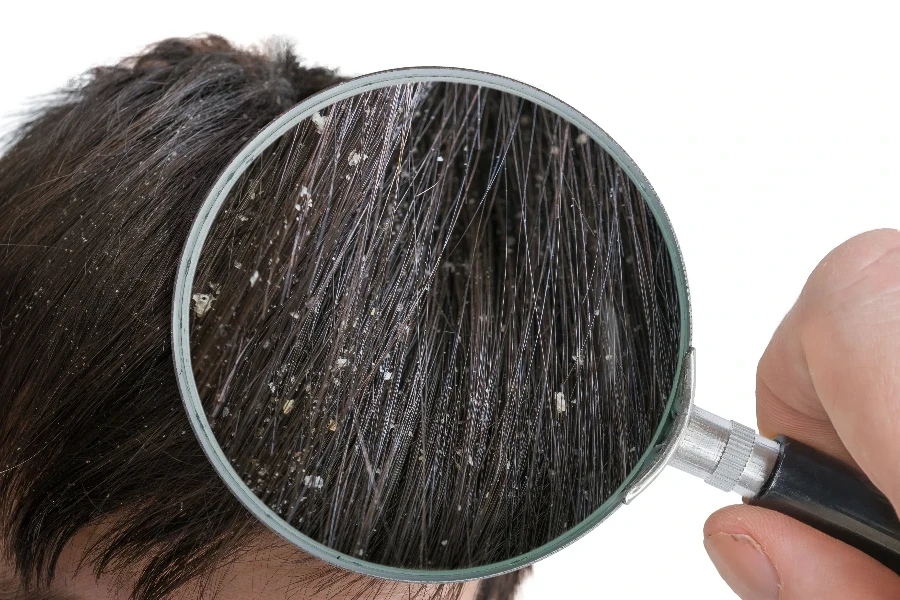Dandruff, a common scalp condition characterized by flaking and itching, has seen a significant rise in demand for effective treatment solutions. As we delve into 2025, the market for dandruff treatment products is expanding rapidly, driven by increasing consumer awareness and innovative product developments. This article explores the growing demand for dandruff treatment products, analyzing market trends and social media buzz that highlight the potential growth opportunities in this sector.
Table of Contents:
– Exploring the Rising Demand for Dandruff Treatment Products
– Popular Dandruff Treatment Products: Types, Ingredients, and Effectiveness
– Addressing Consumer Pain Points with Effective Solutions
– Key Factors to Consider When Sourcing Dandruff Treatment Products
– Wrapping Up: Final Thoughts on Sourcing Dandruff Treatment Products
Exploring the Rising Demand for Dandruff Treatment Products

Defining Dandruff Treatment: What Are We Talking About?
Dandruff treatment encompasses a range of products designed to alleviate the symptoms of dandruff, including shampoos, conditioners, serums, and scalp treatments. These products often contain active ingredients such as zinc pyrithione, ketoconazole, and salicylic acid, which help reduce flaking, itching, and inflammation. The goal of dandruff treatment is not only to provide immediate relief but also to prevent recurrence by addressing the underlying causes of dandruff, such as fungal infections or dry scalp conditions.
Market Potential: Analyzing Demand Growth and Trends
The global hair and scalp care market, which includes dandruff treatment products, was estimated at USD 103.17 billion in 2024 and is projected to grow at a compound annual growth rate (CAGR) of 6.73%, reaching USD 154.79 billion by 2030. This growth is fueled by several factors, including the increasing prevalence of dandruff and other scalp conditions, rising consumer awareness about scalp health, and the introduction of innovative and effective treatment solutions.
According to a professional report, the market for anti-dandruff products is segmented into various types, including shampoos, conditioners, and serums, catering to different consumer needs. The report highlights that the demand for anti-dandruff shampoos remains the highest, driven by their ease of use and effectiveness. Additionally, the growing trend of natural and organic products has led to the development of herbal and chemical-free dandruff treatments, appealing to health-conscious consumers.
Social Media Buzz: Trending Hashtags and Broader Trend Topics
Social media platforms play a crucial role in shaping consumer preferences and driving market trends. In 2025, hashtags such as #DandruffFree, #ScalpCare, and #HealthyHair are trending, reflecting the growing interest in dandruff treatment and overall scalp health. Influencers and dermatologists are actively promoting various dandruff treatment products, sharing their personal experiences and recommendations, which significantly impact consumer purchasing decisions.
Moreover, broader trend topics such as self-care, wellness, and natural beauty are aligning with the demand for effective dandruff treatments. Consumers are increasingly seeking products that not only address their scalp issues but also contribute to their overall well-being. This shift towards holistic health and wellness is expected to drive the growth of the dandruff treatment market further.
In conclusion, the rising demand for dandruff treatment products in 2025 is a testament to the growing awareness and importance of scalp health. With innovative products, increasing market potential, and the influence of social media, the dandruff treatment sector is poised for significant growth, offering lucrative opportunities for businesses in the beauty and personal care industry.
Popular Dandruff Treatment Products: Types, Ingredients, and Effectiveness

Shampoos and Conditioners: Pros, Cons, and Consumer Feedback
Shampoos and conditioners are the most common products used for dandruff treatment. These products are formulated with active ingredients such as ketoconazole, coal tar, zinc pyrithione, and salicylic acid, which are known for their therapeutic benefits. According to a report by Research and Markets, the global medicated shampoo market is experiencing steady growth due to the increasing prevalence of scalp-related issues and advancements in formulation technology.
The pros of using shampoos and conditioners for dandruff treatment include their ease of use and the ability to incorporate them into regular hair care routines. They are effective in reducing dandruff symptoms such as flakiness and itchiness. However, some consumers have reported that certain shampoos can be harsh on the scalp, leading to dryness and irritation. Consumer feedback highlights the importance of choosing products that are suitable for specific hair types and scalp conditions.
Serums and Oils: In-Depth Analysis of Ingredients and Effectiveness
Serums and oils are gaining popularity as effective solutions for dandruff treatment. These products often contain natural and organic ingredients such as tea tree oil, aloe vera, and botanical extracts, which are known for their soothing and anti-inflammatory properties. According to a professional report, consumers are gravitating towards medicated shampoos formulated with natural and organic ingredients, aligning with the preference for clean, sustainable, and environmentally conscious options.
The effectiveness of serums and oils lies in their ability to provide targeted relief to the scalp. They can be applied directly to the affected areas, allowing the active ingredients to penetrate deeply and address the root cause of dandruff. However, the application process can be time-consuming, and some consumers may find the texture of oils to be greasy. Despite these drawbacks, consumer feedback indicates a high level of satisfaction with the results, particularly in terms of reducing scalp irritation and promoting overall scalp health.
Natural and Organic Solutions: Consumer Preferences and Market Trends
The demand for natural and organic dandruff treatment products is on the rise, driven by growing consumer awareness of the potential health risks associated with synthetic chemicals. According to a report by Research and Markets, there is a growing demand for products that use natural and organic ingredients, perceived as gentler and safer for both the body and the environment. Brands are incorporating ingredients like tea tree oil, aloe vera, and herbal remedies known for their therapeutic properties.
Market trends indicate a shift towards clean and sustainable beauty products. Consumers are increasingly seeking products that are free from harmful chemicals and are environmentally friendly. This trend is reflected in the growing popularity of DIY options and home remedies for hair care. Brands that prioritize sustainability in their packaging and manufacturing processes are likely to appeal to environmentally conscious consumers.
Addressing Consumer Pain Points with Effective Solutions

Common Issues: Itchiness, Flakiness, and Scalp Sensitivity
Dandruff is often accompanied by common issues such as itchiness, flakiness, and scalp sensitivity. These symptoms can be uncomfortable and embarrassing for consumers, leading to a negative impact on their overall well-being. According to a professional report, factors like pollution, stress, genetics, and unhealthy lifestyles contribute to these scalp issues.
Effective solutions for addressing these pain points include products that provide targeted relief and treatment. Medicated shampoos, serums, and oils that contain active ingredients such as ketoconazole, zinc pyrithione, and tea tree oil are known to be effective in reducing itchiness and flakiness. Additionally, products that are formulated to be gentle on the scalp can help alleviate sensitivity and irritation.
Consumer Feedback: What Buyers Are Looking For
Consumer feedback plays a crucial role in shaping the dandruff treatment market. Buyers are looking for products that are effective, easy to use, and gentle on the scalp. According to a professional report, consumers seek personalized solutions for their hair and scalp concerns. Brands that offer customizable options within the medicated shampoo category, allowing consumers to mix and match ingredients to suit their unique requirements, are likely to gain a competitive edge.
Additionally, consumers are increasingly prioritizing products that align with their values, such as those that are environmentally friendly and free from harmful chemicals. Brands that leverage digital marketing strategies and e-commerce platforms to reach a wider audience and showcase the benefits of their products are likely to see higher engagement and sales.
Key Factors to Consider When Sourcing Dandruff Treatment Products

Quality and Safety Standards: Ensuring Compliance
When sourcing dandruff treatment products, it is essential to ensure that they meet quality and safety standards. According to a report by Research and Markets, adhering to regulatory standards and ensuring consumer safety is crucial due to the active ingredients in medicated shampoos. Rigorous testing, proper labeling, and clear usage instructions are essential to address safety concerns.
Business buyers should prioritize suppliers that comply with local regulatory standards and have a proven track record of producing high-quality products. This includes verifying the safety and efficacy of the active ingredients used in the products and ensuring that they are free from harmful chemicals.
Supplier Reliability: Evaluating Trustworthiness and Consistency
Supplier reliability is another critical factor to consider when sourcing dandruff treatment products. Evaluating the trustworthiness and consistency of suppliers is essential to ensure a steady supply of products that meet quality standards. According to a professional report, the rapid growth of the medicated shampoo market has led to increased competition among brands, making it important for manufacturers to employ innovative marketing tactics and product differentiation strategies.
Business buyers should conduct thorough due diligence on potential suppliers, including reviewing their reputation in the market, their production capabilities, and their ability to meet delivery timelines. Establishing strong relationships with reliable suppliers can help ensure a consistent supply of high-quality products.
Cost and Pricing Strategies: Balancing Quality and Affordability
Balancing quality and affordability is a key consideration for business buyers when sourcing dandruff treatment products. According to a report by Research and Markets, price sensitivity is a significant challenge in the medicated shampoo market. Medicated shampoos often come with a higher price tag due to their specialized formulations, deterring price-sensitive customers from purchasing them.
Business buyers should work with suppliers to develop cost-effective pricing strategies that do not compromise on quality. This may include negotiating bulk purchase discounts, exploring alternative ingredients that offer similar therapeutic benefits at a lower cost, and leveraging economies of scale to reduce production costs.
Wrapping Up: Final Thoughts on Sourcing Dandruff Treatment Products

In conclusion, sourcing dandruff treatment products requires careful consideration of various factors, including the effectiveness of the products, consumer preferences, and market trends. Business buyers should prioritize quality and safety standards, evaluate supplier reliability, and develop cost-effective pricing strategies to ensure a steady supply of high-quality products. By staying informed about the latest innovations and consumer feedback, business buyers can make informed decisions that meet the needs of their customers and drive business growth.



